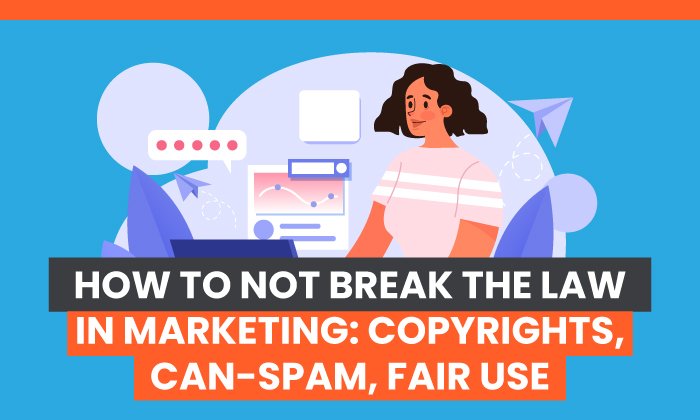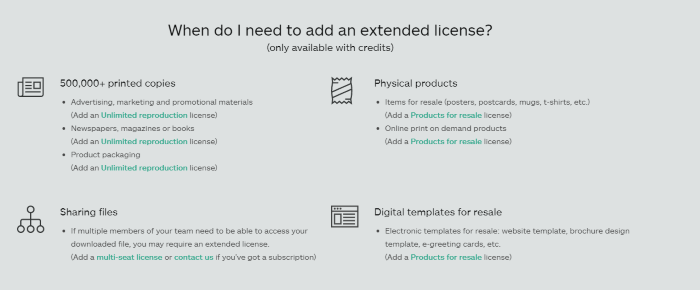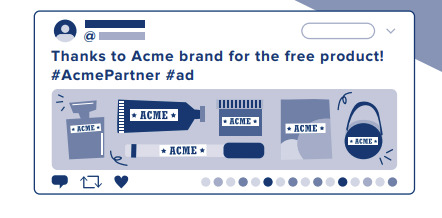
Creating a marketing campaign? Besides performing research and finding the right keywords, you’ll need to ensure your campaign follows marketing laws.
Do you know which laws apply to you and which don’t? That can vary based on industry and location. However, here’s a quick rundown of the most common marketing laws in the U.S. and abroad.
Marketing Laws to Be Aware of and Follow
All this talk about laws can be a bit overwhelming. I get that. First, consider asking a legal expert (not me!) if you have specific questions. Keep in mind that if you don’t steal content and don’t try to mislead your customers, you’ll likely stay on the right side of the law.
However, some rules can be a little tricky. This is why I’ve created this list of laws and regulations all business owners and marketers need to know about.
1. Copyright Laws and Rules in Marketing and Advertising
Most marketers know how effective compelling images can be when it comes to engaging readers. However, you can’t just grab any photo off the internet and use it in your ads or marketing.
The moment an artist creates an image, a writer pens a post, or a guy cuts some slits in a canvas and calls it art, they’ve got copyright. While registration is required to enforce that copyright, there’s nothing they have to do to hold that right in the first place. This is different from trademarks and patents, which do require both registration and a fee.
What does this mean for you? Here’s what you need to know:
- Don’t use images without permission unless they are open source or royalty-free.
- Provide attribution (link) to images when required.
- Don’t copy images, content, or phrases from other brands.
- Ensure you can alter images before doing so.
Resources on Copyright Laws in Marketing and Advertising
- Copyright Law of the U.S. | Copyright.gov
- Can I Use that Picture? Infographic Revised and Simplified! | The VCG
- 10 Tools to Find High-Quality Images for Your Blog and Social Media | Neil Patel [PDF]
2. Terms of Use in Marketing and Advertising
Terms of Use is not a law, per se, but rather distinct regulations, including copyright laws and the regulations, on how media can be used on different platforms.
For example, you can’t just take images off Twitter and use them on your website (at least not unless you want to pay $1.2 million.) Not all photos can be used in every situation. For example, a photo from iStock with a “standard license” can be used in advertising, apps, websites, etc.
However, if some situations exceed their terms of service, this requires buying an extended license:

Some photography sites are free for personal or non-commercial usage. They may require a fee to use the photo in an ad or to alter the photo. Make sure you pay attention to where your photos, videos, and icons come from and their terms of use.
Resources on Terms of Use Laws in Marketing
- Twitter Terms of Service (which includes terms of use)
- Instagram Terms of Use
- Creative Commons Attribution-Sharealike: Outlines their terms of use
3. Laws on the Use of User Data in Marketing and Advertising
Multiple laws and regulations impact how businesses collect and use data. The Privacy Act of 1974 establishes fair practices on the collection, maintenance, and use of data in the U.S.
GDPR limits how much data you collect, how you store it and gives users the right to ask you to delete it. While it’s a European law, it applies if you have any European users (which most of us do.)
This video outlines what you need to know:
Depending on your state, there may be other laws you need to follow. California has some of the most restrictive data privacy laws, called CCPA, so definitely pay attention if your company conducts business there. The CCPA also applies to companies outside of California that do business in the state.
Resources on Laws About User Data in Marketing and Advertising
- General Data Protection Regulations (GDPR)
- California Consumer Privacy Act
- Complete Guide to Privacy Laws in the U.S.
- 5 Privacy Policy Generator Options for Your Website
4. Follow the CAN-SPAM Act
Do you use email marketing for your business? If so, you’ll want to pay attention to the CAN-SPAM act. This law covers all commercial messages, including B2B messages. Each email that violates CAN-SPAM can result in fines up to $43,792, so getting this wrong can cost you a bundle. Here are the rules:
- Don’t use false or misleading headlines, email addresses, or domain names. You must accurately identify yourself when sending marketing messages.
- Disclose emails are an ad.
- Share your location.
- Provide a method for users to opt-out of email messages.
- Monitor what other businesses do on your behalf. For example, if you hire a marketer to do email marketing for you, you’re still responsible for their actions.
CAN-SPAM Act Resources
- How to Stay In Line With the Law When Sending Marketing Emails | Neilpatel.com
- CAN-SPAM Act: A Compliance Guide for Businesses | FTC
5. Comply With Truth-in-Advertising Standards
Truth in Advertising Standards is a set of rules outlined by the FTC designed to stop scams, prevent fraud, and get compensation from businesses to repay victims of fraud. These laws apply to all types of media, including ads in print, online, in the mail, or on billboards.
As long as you are truthful in ads, these laws shouldn’t impact your advertising. Truth in Advertising is a group of laws that covers:
- false or misleading health claims
- funeral advertising
- fraudulent or deceptive gift card practices
- being upfront with customers by not using misleading endorsements
Truth-in-Advertising Resources
- Truth in Advertising Regulations | FTC
- Truthindadvertising.org: A non-profit organization that empowers consumers to protect themselves against false or misleading marketing.
6. Comply with COPPA (Children’s Online Privacy Protection Act) and Other Laws About Advertising Children’s Products
COPPA is a protection rule put in place by the FTC. It controls the amount of data brands can collect on children under 13 and how you identify them. If your target audience is children, you’ll want to pay special attention to COPPA. However, even if your audience is adults, you need to be aware of the rules.
Here’s what it says:
- Post an online privacy policy that describes how you collect personal data for children under 13.
- Make efforts to provide parent notification of how you collect and use data. In some cases, you may need parental consent.
- Allow parents to access and limit data collected about their children.
- Only retain personal information for as long as necessary.
Some companies (think social media platforms) avoid the issue altogether by not allowing children under 13 to create accounts. If you advertise to children, you must also comply with the truth in advertising standards.
COPPA Resources
- Children’s Online Privacy Protection Rule (“COPPA”) | FTC
- COPPA explained | CSO
7. When Using Influencers, Comply With the Endorsement and Testimonials Rules Outlined by the FTC
Influencer marketing is a fantastic way to build your brand and instill trust in consumers. However, it’s important to make sure you follow the rules laid out by the FTC. These include:
- Influencers must disclose any financial, employment, personal, or financial relationship with a brand. This is usually done by adding #ad or #sponsored on social media or blog posts.
- Don’t bury the disclosure in a mix of other hashtags; it must be easy to see.

- Influencers can’t talk about an experience with a product they haven’t tried.
- Depending on the platform, influencers may be required to tag the brand; however, it’s not a legal requirement. Check the platform for additional requirements.
- Influencers can’t make claims that require proof that doesn’t exist—such as claiming it treats an illness or health condition.
Essentially, don’t lie, don’t ask influencers to lie, and make sure to disclose any relationship with an influencer.
Endorsement and Testimonial Laws Resources
- Influencer Marketing and FTC Regulations | Forbes
- Disclosures 101 for Social Media Influencers | FTC
8. Use Consumer Reviews in Accordance With the Law
Consumer reviews are a great way to build trust. However, they have to be used carefully. According to the Customer Review Fairness Act, businesses cannot:
- use a contract to bar someone from leaving a review
- impost a fee or penalty for leaving a review
- require users to give up their intellectual property in reviews
The law doesn’t just apply to product reviews, but also social media posts, online reviews, photos, and videos.
Customer Review Laws Resources
- Consumer Review Fairness Act | FTC
9. Follow Rules Related to Environmental Marketing
As more Americans look to go green, companies have ramped up their marketing efforts. The problem is sometimes what companies say and what consumers think they mean don’t always line up.
The Green Guides are FTC’s answer to this conflict. It sets guidance on product certifications, seals of approvals and defines words like “renewable” and “carbon offset.” The rules:
- gives guidance on words like compostable, ozone, and recyclable
- advises companies not to make unverified claims about degradability unless the entire product or packages breaks down in one year
- addresses product claims of being “non-toxic.”
The guides are long, so I recommend reading in their entirety before making environmentally-friendly claims.
Resources on Rules About Making Environmental Claims in Marketing and Advertising
- FTC Revised Green Guides | FTC
How to Not Break the Law in Marketing Frequently Asked Questions
How do I know if I’m breaking the law with an ad or marketing campaign?
Get familiar with the laws so you know before you launch a campaign. Having a legal team review your marketing can highlight legal issues before they become a headache. If you receive legal paperwork related to an ad or campaign, get legal help.
What happens if I break a marketing law?
The penalty varies by law and location. Some laws can result in hundreds or thousands of dollars in fines.
What are the most important marketing laws to follow?
They are all important, but the most important laws are copyright laws and
Truth in Advertising. Make sure your marketing is honest, straightforward, and only use images you have permission to use.
Should I have a lawyer audit my ads and campaigns?
If you can afford it, absolutely. Or, take a crash course in marketing law by reading up on the resources listed above.
{ “@context”: “https://schema.org”, “@type”: “FAQPage”, “mainEntity”: [ { “@type”: “Question”, “name”: “How do I know if I'm breaking the law with an ad or marketing campaign?”, “acceptedAnswer”: { “@type”: “Answer”, “text”: “Get familiar with the laws so you know before you launch a campaign. Having a legal team review your marketing can highlight legal issues before they become a headache. If you receive legal paperwork related to an ad or campaign, get legal help.” } } , { “@type”: “Question”, “name”: “What happens if I break a marketing law?”, “acceptedAnswer”: { “@type”: “Answer”, “text”: “The penalty varies by law and location. Some laws can result in hundreds or thousands of dollars in fines.” } } , { “@type”: “Question”, “name”: “What are the most important marketing laws to follow?”, “acceptedAnswer”: { “@type”: “Answer”, “text”: “They are all important, but the most important laws are copyright laws and Truth in Advertising. Make sure your marketing is honest, straightforward, and only use images you have permission to use.” } } , { “@type”: “Question”, “name”: “Should I have a lawyer audit my ads and campaigns?”, “acceptedAnswer”: { “@type”: “Answer”, “text”: “If you can afford it, absolutely. Or, take a crash course in marketing law by reading up on the resources listed above.” } } ] }
How to Not Break the Law in Marketing Conclusion
Building a successful marketing strategy is no easy task. There are technical aspects, like keyword research and competitive analysis, but you’ll also need to make sure your ads and campaigns do not break the laws in marketing.
This list provides a starting point of the most important marketing laws you need to know. However, you’ll also need to research state and industry laws. For example, medical and health care companies are held to additional standards.
What laws in marketing surprised you the most? Are there any not on this list you think should be added?

